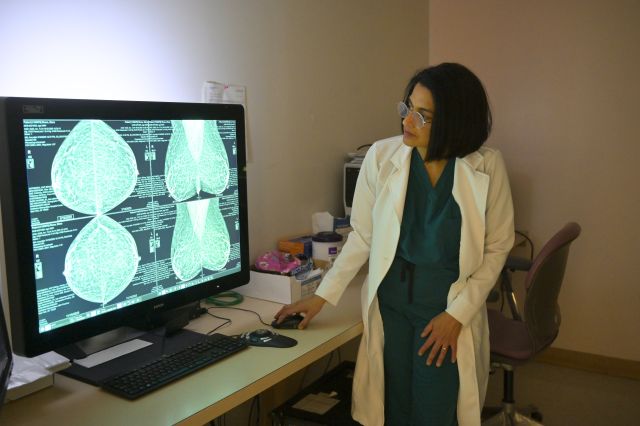
From Chennai to Harlem: Breaking Barriers
Meet Dr. Anitha Srinivasan, First Woman CMO of Metropolitan Hospital
Talk of woman power! She is the first woman Chief Medical Officer at Metropolitan Hospital, currently one of only two female CMOs across the 11 NYC Health + Hospitals hospital facilities, and the only woman of color in that role.
Dr. Anitha Srinivasan, born and brought up in Chennai, found herself in Harlem at the age of 23 – and instantly felt connected to that essential part of New York – and has now spent the last 20 years caring for this often-forgotten community.
The Metropolitan Hospital is a 338-bed facility serving East Harlem and surrounding communities and has been a part of the neighborhood for over 150 years. Known historically as the primary healthcare provider in El Barrio, Metropolitan delivers care to over 350,000 clinic patients and more than 50,000 emergency room visitors annually. It is part of NYC Health + Hospitals which is the largest municipal health care system in the nation serving more than a million New Yorkers annually.
Srinivasan began her career in the 1990s with a surgical residency at NYC Health + Hospitals/Lincoln. After several years at an academic research center, she joined Metropolitan Hospital as an attending surgeon and associate professor of surgery at New York Medical College, where she founded the Metropolitan Breast Cancer Center and has served as its Director since 2017. In 2019, she was appointed Deputy Chief Medical Officer, and in 2020, she expanded her leadership role by becoming Director of Perioperative Services.
While waiting for her residency to be processed, Srinivasan was in Boston, finishing her medical requirements in various hospitals, and also did a year of research with an orthopedic surgeon. She had a choice between a hospital in Boston versus one in the South Bronx. She chose the one in the Bronx and started her training in the same system in Health and Hospitals at Lincoln Hospital, a big trauma center.
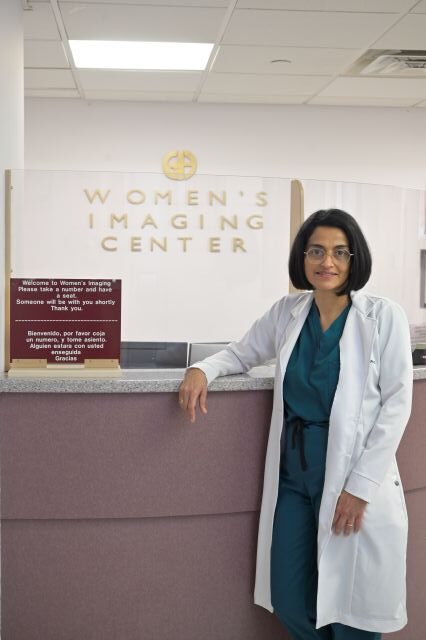
In an interview with Lassi with Lavina, Srinivasan spoke about work, family and the impact of India on her success story.
From a raw new resident right to becoming the CMO of the fast-paced Metropolitan Hospital, Srinivasan has seen it all.
“It was a completely different world,” she recalls. “I sat in the subway from Manhattan, and I went for my interview, and I was totally hooked. I looked around – it was such a diverse population, I felt like I really belonged. This was in 1994, and in Boston, at least most days, I didn’t have that sense of belonging, whereas in New York I felt like I belonged anywhere, because everybody came from different parts of the world.”
So how was it like starting out, coming from Chennai, which must have been a very different world?
“South Bronx was not a typical area where a young woman from India would want to work but I loved the program, I loved the vibrancy. It was a very, very hard program. The residents hardly got to sleep, as this was before they had those regulations mandating resident training hours. It was a very busy Trauma Center, a lot of gunshot wounds and stuff like that.”
She adds, “But somehow, I liked the people. I was very drawn to it, maybe because I come from a family where both my parents worked in a public health system where it was very, very busy. I liked the crowds. I liked the fact that you saw difficult cases, and I thought it would be a great training place, and I had wonderful coworkers and peers.”
Over the years her affection for and interaction with the community has continued to grow and fortify. “I have to tell you that the culture was so warm, people loved me so much. They were Spanish, African American, very mixed. Bangladeshis were starting to live there. So, it was an education not only medically, but in life. It was a wonderful experience. I mean, that community took me in! They would feed me, my nurses. I have very fond memories – I got addicted to the Cuban coffee there!”
Was there a plus point in working in that challenging environment for decades? She says, “I think my confidence and my whole attitude towards service and working in a public hospital system was inspired by living there because I realized there’s a whole different part of New York that is real, where you can actually relate to people. They work in 9 to 5 jobs. They work two jobs, three jobs. They struggle with life but they’re very warm people. No, it’s not a very manicured part of society – and that really appealed to me. I felt like I belonged there.”
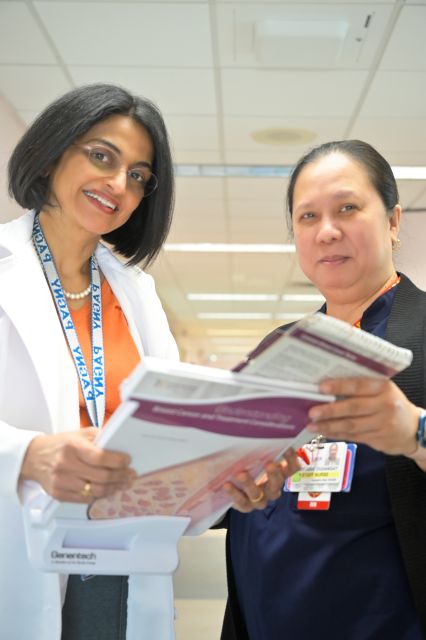
9 Questions for Dr. Anitha Srinivasan, CMO of the Metropolitan Hospital
What part of India are you from? We’d love to hear a bit about your background, especially since many of our readers are from India and South Asia.
I grew up entirely in Chennai, a vibrant city with a population of over 6 million. Despite its size, it still feels to me like a smaller, more intimate city steeped in South Indian tradition and culture. I pursued my medical education at Ramachandra Medical College, which was affiliated with Madras University at the time. It has since become an independent university in Chennai.
Can you tell us about your growing years in India?
As children, my two sisters and I were raised largely by our grandparents while our parents dedicated themselves to their medical careers. Watching them, especially my mother, balance career and family, gave me a deep respect for discipline, dedication, and the meaningful impact of work. Growing up in a large household with a working mother instilled in me a strong sense of adaptability, responsibility, and purpose.
Is there an Indian element in your success story?
Absolutely, I would never take away from that growing up in a very competitive environment, which is what India was, getting into medical school. You know, everything is just so much more in numbers, so many more people are competing for the same thing. It just gives you that very competitive spirit and push for hard work, because you realize very early on in life your success is directly related to the amount of work you put in and the effort you put in.
I think that also gives you an advantage in terms of dealing with people. You become very adaptable, growing up in India. I learned to deal with different people. I had a big extended family, so I don’t judge people. I always look for the positive in anybody I see, no matter where their background is. I think being in India gives you that, because we are a true melting pot there, just as New York is.”
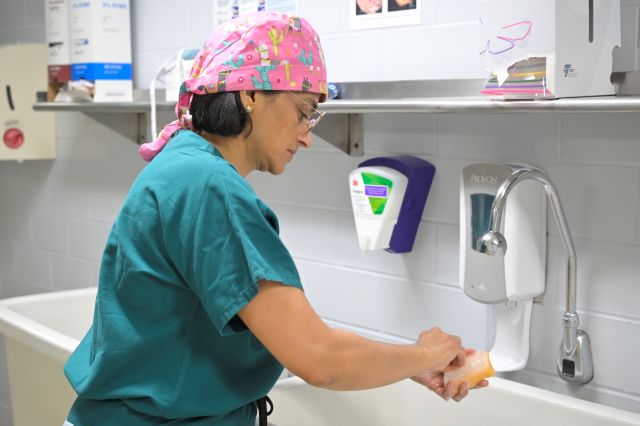
Metropolitan has the oldest hospital-medical school affiliation in the U.S. What can you tell us about its relationship with New York Medical College and what it means to you?
Metropolitan Hospital holds the distinction of having the oldest continuous affiliation with a medical school in the United States. This enduring partnership with New York Medical College is historically significant—it brought together a hospital committed to equitable care and a medical college known for being one of the first to accept students regardless of religion or race. This shared legacy of inclusivity and service resonates deeply with me. Over the past 23 years, this affiliation has given me the privilege of mentoring countless students and residents, creating a legacy of learning and collaboration that I’m truly proud of.
The Metropolitan Hospital is a leader in LGBTQ and healthcare equity. Tell me about that aspect of the services.
We have a very, very new and beautiful Pride Center. We are happy to say that we were the first in the healthcare system, New York City Health and Hospitals, to start offering gender affirming surgery. We’ve done more than 250 of gender affirming surgeries with a plastic surgeon that’s qualified to do these. We just don’t do the surgery alone, we make it a comprehensive care so we have people who are trained for the hormonal maintenance, the regular primary care of these people, and as well, as we make sure they don’t feel isolated in any way, so you can get all the services that you need, just like anybody else in our system.
What do your parents think of your role – you’ve gone up through the ranks and you’re at the top now.
My mother was a medical director before she retired. Unfortunately, she passed away 15 years ago in New York. She was a surgeon, a gynecologic surgeon. My father is a retired anesthesiologist. He turns 90 this year and lives in California. He’s extremely proud of my accomplishments, of course, and I’ve always been, unfortunately for my sisters, the favorite because I chose this field! He is very, very happy that I’ve chosen this path. I’ve pivoted to administration, and I have a very dedicated, clear path that I want to stick to.
How have your husband and children reacted to your new position?
My husband, who is not in medicine, is very supportive. He’s a finance guy, and despite that, he won’t know the difference between two specialties, but he will laugh at all my medical jokes! My two children are 18 and 20, and no matter how much my coworkers appreciate me, my children keep moving my goalpost – I’m never good enough for them!
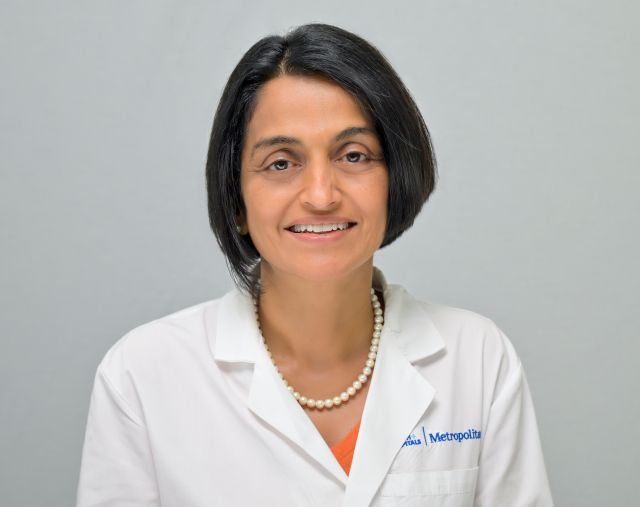
What are your hopes and aspirations for the future of healthcare in the community?
I truly believe that medicine is a scientific knowledge applied to a very human role for better community and healthy living. And to do that, we need to accept technology, research and everything into clinical practice and make it applicable to what we have today. I believe a public hospital system does best for everybody, irrespective of the ability to pay. My aspiration for this hospital and our system is to continue that, and I don’t want to give any different care than the best in the country to my patients here, and I don’t want to ever differentiate that, based on their ability to pay or their insurance status or anything else.
You are the first woman Chief Medical Officer at the Metropolitan Hospital? What do you think of that achievement?
Well, I’m very thankful, and I think women are having an increasing role in medicine with our medical school classes also having more women. I belong to and was trained in a surgical field which was very much an Old Boys Club. So that itself has shaped me, and that’s changing, and it’s wonderful, because bringing women into the table in medicine and surgery brings a very steady judgment and a calm hand. And I think it balances a lot of the machismo.
And, you know, I think it brings excellent judgment into the field. However, I do feel that everybody comes into medicine, based on merit, irrespective of their gender, but women were not allowed to come up in leadership roles earlier. Now they are rising up, and I think this brings a very beautiful aspect to medicine, and it brings a very humanistic approach to medicine.
Visit www.nychealthandhospitals.org
Related Article
Siddhartha Mukherjee: Chasing Cancer
